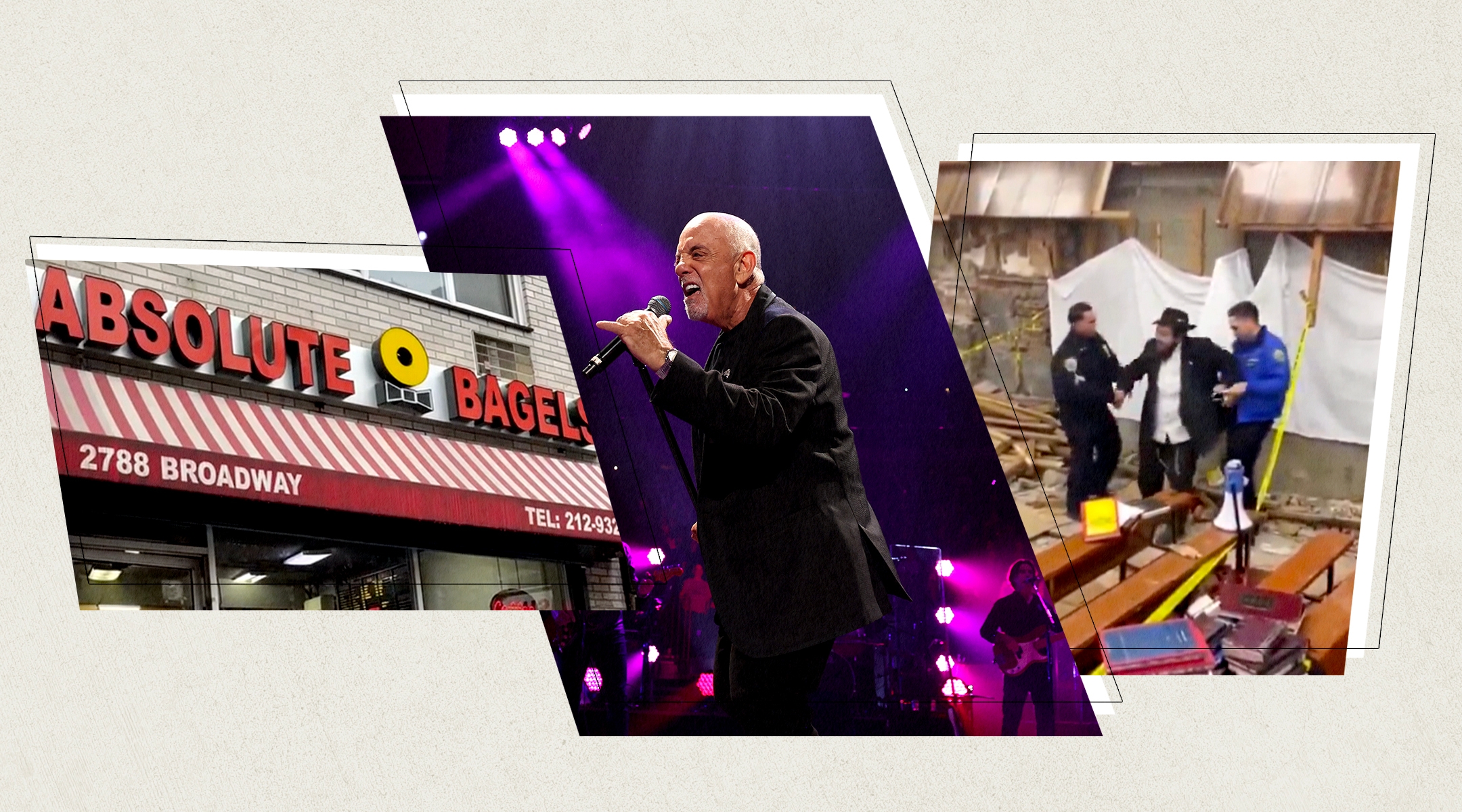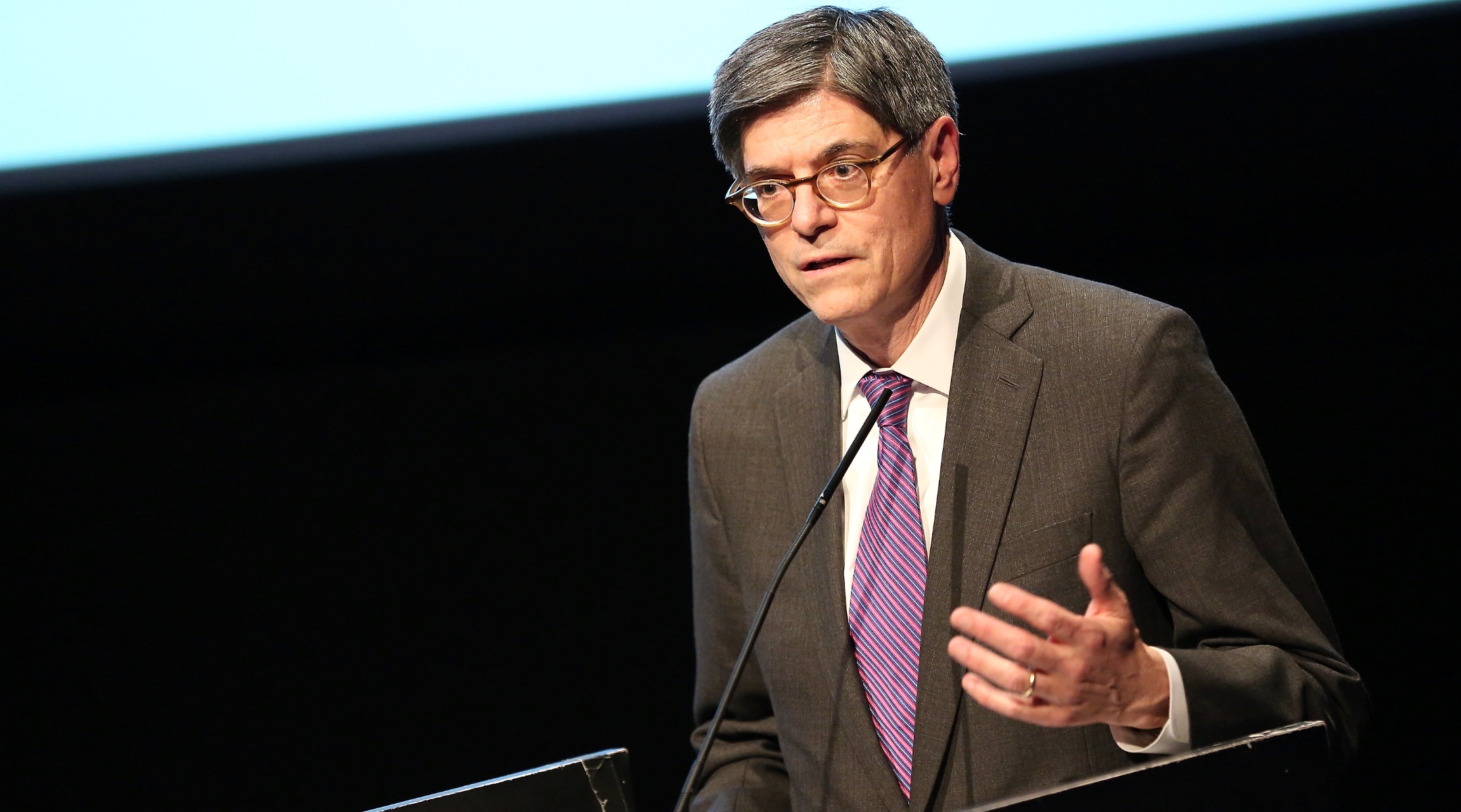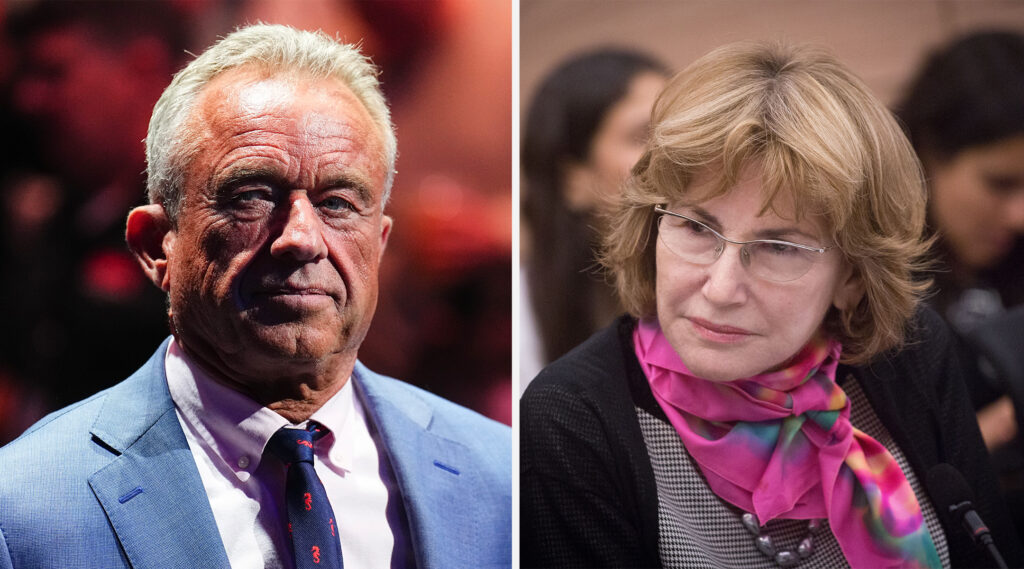In November of 2022, a Jewish security group flagged a tweet from a white supremacist named Christopher Brown threatening to “shoot up a synagogue.” The group, the Community Security Initiative, alerted law enforcement, who arrested the suspect at Penn Station, finding a Nazi armband, a knife and a ski mask in his backpack.
CSI was surprised to hear that police arrested an accomplice with Brown — a Jewish man named Matthew Mahrer. At Mahrer’s home, police recovered a Glock 17 pistol enhanced with a red dot sight that they believe Brown planned to use in the attack.
Brown was sentenced to 10 years in prison last month. Days later, Mahrer, 24, pleaded guilty to felony weapons charges — and now his case is dividing Jewish activists.
Mahrer faces a yearslong prison term at his sentencing next month. Some Jewish advocates are urging a stiff sentence for his role in procuring the weapon. Others are calling for leniency, saying Mahrer was unaware of Brown’s plot, has a history of mental health issues and has rehabilitated in the past two years.
“This is a case where we see that the rehabilitation that should’ve taken place through the court system happened with the support of parents, and a young man who wanted to change his ways and come to terms with what he had done,” said Sheldon Fine, the vice chair of the West Side Council of Orthodox Jewish Organizations. Fine has gotten to know Mahrer’s family, who live on the Upper West Side.
Fine added, “If he’s accomplished this independently with the support of his parents over two years, what would be the sense of incarceration?”
But Glenn Richter, a member of Ohab Zedek, a nearby synagogue, said the proximity of the incident affected his feelings about the case. He is pushing for what he calls a “meaningful sentence.”
“The shul is literally around the corner from the Mahrer apartment, where Matthew stashed the loaded, enhanced gun in his bedroom,” said Richter, who was a prominent activist for Soviet Jewry. “We could have been the marked shul. This certainly colors our feeling about Mahrer’s sentence.”
Ahead of Mahrer’s guilty plea late last month, his parents, Michael and Susan, hoped for leniency and understanding, saying they had long struggled to get their son adequate mental health treatment.
Mahrer’s parents said their son has high-functioning autism, was bullied in high school and was homeless for a period during the COVID pandemic, an episode that traumatized him. They said they had long struggled to get adequate treatment for him.
He spent four years in two different residential treatment centers but was not placed in the right environment, they said. At one point, he was housed with youths with low-functioning autism, his father said, adding that that was “isolating and disturbing for him.”
He said his son had not received proper care until after his arrest but has received counseling and job training since then.
“What’s going on today is really in a very great sense a continuation of the way Matthew has been let down by the system over and over again,” Michael Mahrer said in a phone interview.
Since then, Matthew Mahrer has become certified as a peer counselor and has mostly remained at his family home on the Upper West Side, his parents said.
Mahrer met Brown while staying at a residential treatment center, his parents said. While he was homeless, Mahrer separately got to know a third defendant in the case, Jamil Hakime, who was employed by the city in youth services. Mahrer’s father said Brown had claimed he needed a weapon for self defense. Brown paid Mahrer $650, and Mahrer introduced Brown and Hakime.
Federal prosecutors said Brown posted the threatening tweet early in the morning of Nov. 18, 2022. Brown and Mahrer contacted Hakime that afternoon, and the three drove in Hakime’s car to Pennsylvania, where Hakime had a home. During the drive, police contacted Brown by phone about the threatening posts, which Brown then deleted. Mahrer’s parents said he did not use Twitter and had no knowledge of the posts.
In Pennsylvania, Hakime sold the pair the firearm with an extended magazine and 19 rounds of ammunition, showed Mahrer and Brown how to use the weapon, and told them to wipe off his fingerprints, prosecutors said. Hakime drove the pair back to Manhattan.
Brown and Mahrer then hid the weapon in Mahrer’s bedroom at his family home and went to Penn Station, where they were arrested. Brown later told police he had been “nervous about the police” ahead of buying the gun but “Matt bought it anyway,” and that he had planned to “blow my brains out.” Asked about why the gun was in Mahrer’s home, his lawyer, Gilbert Bayonne, declined to comment on specifics of the case, and that some facts had not been disclosed publicly because the case did not go to trial.
Hakime was sentenced to 27 months in prison earlier this year in the federal southern district court of New York. Mahrer’s lawyer, Bayonne, said he would likely be sentenced to 2.5 years in prison.
Mahrer’s parents said their son pleaded guilty in order to accept a plea bargain and avoid a costly trial. “We just don’t have the financial resources nor do we think we have the emotional stamina for it,” said Michael, an English teacher.
But they said that the guilty plea did not make their son an antisemite. Mahrer’s grandfather and great grandfather are Holocaust survivors, and he “is very sensitive to our family history and the suffering that his grandparents and great grandparents went through,” his father said.
The family, who first told their story to the Forward last year, said they are not currently members of a synagogue but celebrate holidays with Susan’s family in New York.

A firearm recovered from Matthew Mahrer’s Upper West Side apartment, Nov. 18, 2022. Mahrer, 24, pleaded guilty to felony weapons charges. (U.S. Attorney’s Office, Southern District of New York)
After the arrests, the case drew widespread attention from media and local officials, and stoked fear in the Jewish community. The Mahrers believe the attention and ongoing antisemitism in the city have worked against their son by pushing prosecutors toward a harsher response. Matthew did not have a criminal history prior to his arrest.
“With all the antisemitic crimes in New York and across the country and the international and the national political stage, it’s bigger than we are at this point. It’s bigger than Matthew,” Susan Mahrer said.
“The things some of our community members have said to him outside of the courtroom, it’s devastating because that’s not who he is,” Michael Mahrer said.
Mahrer was not available to comment due to the ongoing legal case. His lawyer, Gilbert Bayonne, said that prosecutors had no evidence Mahrer was aware of Brown’s plot, pointing to the fact that Brown was hit with terror charges, while Mahrer was not.
“He entered a plea of guilty. There’s an acceptance of responsibility and I think that’s huge for a young man who has no legitimate criminal history,” Bayonne said. “Here’s a young man who’s headed down the right path after making a poor choice and still they’re asking him to do upstate time.”
The family does not dispute that Mahrer was in possession of the firearm, but argues that he should be granted an alternative sentence instead of prison time. His parents pointed out that Manhattan District Attorney Alvin Bragg argued in favor of the approach in a New York Times op-ed earlier this year.
“Mental illness isn’t a crime, and jail isn’t the answer for those experiencing it,” Bragg wrote. His office declined to comment.
Some Jewish community members have advocated for such an approach.
Fine said he attended hearings in the case and believed Mahrer should have been remanded to a mental health program for the safety of the local community, as well as Mahrer’s own safety. Fine got to know Mahrer and his parents by speaking with them at the hearings, and heard about Mahrer’s progress in counseling and psychiatric care. His views then changed, he said.
“I’ve seen over time a development of a different human being, a different temperament, more of a calm now and focus,” Fine said regarding the two years he’s known Mahrer, adding that he believed Mahrer has effectively rehabilitated himself in that time with the support of his family.
Phylisa Wisdom, the head of the New York Jewish Agenda, a liberal advocacy group, has been working with the family to build community support. Several rabbis and a couple of elected officials contacted the D.A.’s office to request leniency for Mahrer, she said, but said the officials could not comment publicly.
“We must combat antisemitism and stop antisemitic violence, and we can do that without throwing a vulnerable member of our own community under the bus to win political points,” she said.
Rabbi Joel Mosbacher of Temple Shaaray Tefila, a Reform synagogue on the Upper East Side, learned about the case from Wisdom and contacted Bragg’s office to urge a sentence alternative to prison. He has not spoken directly to the family.
“There were people who kind of lumped him in with Mr. Brown,” Mosbacher said. “He had a different role in this story and he should be held accountable in a different way.”
Mosbacher added, “It’s a Jewish value to care for people with trauma and developmental disabilities.”
Wisdom and Mosbacher stressed Mahrer’s status as a first-time offender in need of mental health care, and praised the prosecution of Brown.
“It’s disheartening and frustrating that Jews would treat other Jews this way,” Mosbacher said. “It’s not that we don’t think there should be accountability, but there needs to be an understanding of context and compassion, even within a situation where a crime was committed.”
Others have called for a stiff sentence. After Mahrer was released on bail, some Jewish community members expressed fear and anger due to the family’s proximity to local synagogues, a fear that still lingers.
Richter and other Jewish community members circulated an email urging others to contact Bragg’s office and ask him to press the judge in the case to “apply a meaningful sentence, reflecting the seriousness of Mahrer’s intent and culpability in the deadly plot.”
They also published a similar call on the Jewish Link news site on Thursday, ahead of the sentencing.
The Zionist Organization of America, which urged supporters to attend hearings in the case, also called for a meaningful sentence.
“I do sympathize for Matthew Mahrer’s family,” said Elizabeth Berney, ZOA’s national director of research and special projects. “However, given the facts described by the DOJ, it is difficult to believe that Mahrer was not also complicit, and deserving of a sentence that sends a message sufficient to deter anyone from participating in plots to murder innocent Jews.”
Mitch Silber, CSI’s director, recounted how the group was surprised when police arrested two suspects at Penn Station.
“We didn’t know there was a No. 2 person, and that was Mahrer, but Mahrer is clearly the person who Brown needed to try and get the weapon for him,” Silber said, adding that he doubts Mahrer was completely unaware of Brown’s antisemitism and plotting.
“I don’t entirely buy it,” Silber said. “Honestly, there is some culpability there that he needs to own.”
But citing Mahrer’s mental health, Silber said an alternative sentence was “certainly a possibility.”
“There are going to be a lot of psych reports that go into the equation here on how this is all resolved,” he said.
The sentencing decision will be made by the judge in the case, Gregory Carro. Diane Peress, an adjunct professor at John Jay College of Criminal Justice and a former prosecutor, said the community members’ outreach “has some impact” on judges and could lessen a sentence.
“The letter from the community is fine, his background for the last two years would also probably be helpful,” she said. “If the judge is so inclined, the judge can take all of this into account.”
She said despite his mental illness, status as a first time offender and doubt over his involvement in Brown’s plot, Mahrer’s weapons charge was still a severe offense. Peress added that judges are wary of releasing defendants due to worries they might commit future crimes.
“A gun is used to hurt or kill somebody. He’s not that mentally ill that he doesn’t know what a gun is. He doesn’t think it’s a banana,” she said. “He got somebody a gun. So that’s the way, as a prosecutor, I would look at it.”
After Mahrer’s guilty plea, his father said the family was “heartbroken and frightened for him.”
“He never intended to hurt anyone and he has been perfect since his arrest,” Michael Mahrer said. “We want the community to know that they are not at risk because of our son, that they never were, and that we are members of this community as well.”
Support the Jewish Telegraphic Agency

Help ensure Jewish news remains accessible to all. Your donation to the Jewish Telegraphic Agency powers the trusted journalism that has connected Jewish communities worldwide for more than 100 years. With your help, JTA can continue to deliver vital news and insights. Donate today.









 English (US) ·
English (US) ·